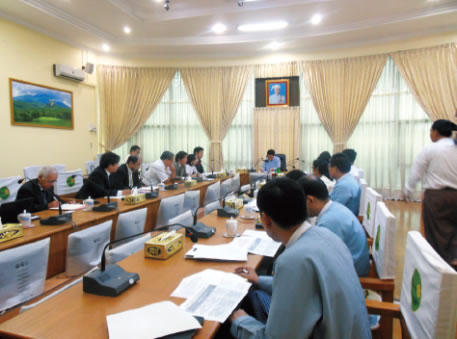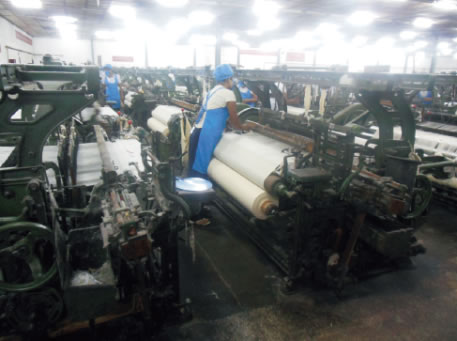Master Techniques from Japan to the World 4
Bringing High Added Value
to the Myanmar Textile Industry
– An SME from a town famous for its textiles working together
with the Ministry of Industry of Myanmar

A meeting with the Minister of Industry of Myanmar and others in Nay Pyi Taw, the capital of Myanmar (Photo: TSUYATOMO Co., Ltd.)

Fabric weaving at a textile factory in Myanmar (Photo: TSUYATOMO Co., Ltd.)
Since 2011, when Myanmar transitioned to civilian rule, its economy has become liberalized, including the easing of import and export restrictions and the formulation of the Foreign Investment Law. Although these developments are creating an environment that will enhance the businesses and the investments by foreign companies in Myanmar, the competitiveness of domestic industries remains weak.
The textile industry is a major export industry for Myanmar, but because of the impact of long-running economic sanctions against the military regime, the industry has declined in mid-stream processes (high-pressure dyeing, finishing processing, and flame retardant processing)1 that require a large amount of investment and focused on downstream processes (sewing) due to low labor costs. In the meantime, the introduction of the Minimum Wage Law2 in September 2015 has demanded that textile business operators relying on producing and processing outsourced to overseas businesses to move away from the low added value industry that is based on cheap labor costs.
TSUYATOMO Co., Ltd. is a company located in Ichinomiya City, Aichi Prefecture, renowned as a textile-manufacturing city. The company sought to assess whether high added value could be created in Myanmar’s textile industry through the introduction of TSUYATOMO’s midstream processing equipment (dyeing machinery) and technologies. To assess the potential for this initiative, under JICA’s Partnership with Japanese SMEs for the Private Sector for Utilizing Japanese Technologies in ODA Project,3 a SME Partnership Promotion Survey4 (as it was then known) was implemented from February to December 2015.
TSUYATOMO has been involved in the textile related industry for more than 90 years and its technological capabilities and high quality products have gained the company a high reputation over the years. For example, TSUYATOMO was the first company to have started manufacturing automobile seats with a flame retardant treatment, which were used in the vehicles of many major automobile manufacturers. However, as Japanese automobile manufacturers began to transfer their manufacturing bases overseas, the domestic production volume of automobile seats has reached its ceiling. TSUYAMOTO’s President Yoshihiro Oguri, while visiting Myanmar in 2012 to investigate, etc. whether to branch out his company’s business to overseas, was therefore grateful “to see the challenges faced by the textile industry in Myanmar and to feel the existing potential.”
The survey focused on government-operated factories. The Ministry of Industry of Myanmar had determined to privatize all of the 144 factories under its jurisdiction by the end of 2015. However, as there were few private sector companies in the country which were capable of responding to the ministry’s preference for an immediate privatization of factories under long-term lease agreements, there are still 56 factories that are under government operation. These factories have been out of operation for an extended period and a major challenge for the government is to get them back up and running.
Mr. Oguri says, “The major challenges in the textile industry in Myanmar are human resources development and creating high added value. We felt that if we transferred international standard dyeing technologies to employees in government-operated companies in Myanmar, it would develop human resources that would further support the country’s textile industry.” In addition, among the local sewing businesses, some companies are also seeking to respond to the enactment of the Minimum Wage Law by moving away from a low labor cost model and by producing branded products with high added value. If TSUYATOMO could transfer its processing technologies to Myanmar, it would therefore also enable such companies to procure material that had been designed and processed nationally according to their own specifications and use this material in their sewing factories to produce. The ability to engage in domestic production from the design stage through to the sewing and finishing stages would enhance its potential to create high added value in the textile industry and also expand employment opportunities.
Based on the results of this Survey, from June 2016, TSUYATOMO went forward with a Feasibility Survey with the Private Sector for Utilizing Japanese Technologies through ODA.5 As part of this process, seven people comprising officials from the Ministry of Industry and the executives from government operated factories in Myanmar, were invited to Japan at the end of September. They engaged in training at TSUYATOMO head office, and learned its industrial technologies and management techniques. In 2017, there is a plan to launch a project that will restore and improve the facilities of government-operated factories in Myanmar.
Mr. Oguri speaks with enthusiasm when he says, “It is not often that an opportunity comes along for a small company such as ours to work together with a government ministry of another country. I want to make this a project that will be meaningful for both sides.”
*1 An expression that likens various industrial processes, including in the textile industry, to the stream flows of a river—upstream, mid-stream and downstream.
*2 This law established a standard daily minimum wage (based on an eight-hour working day) across all companies nationwide of 3,600 kyat (approx. ¥335; 1 kyat = approx. ¥0.093).
*3 Projects aiming to achieve both the development of developing countries and the activation of the Japanese economy by utilizing Japanese SMEs’ excellent products and technologies through ODA.
*4 A survey, based on a proposal from an SME, to gather the necessary basic information and formulate a project plan for an overseas project by the SME (to develop business overseas) that would contribute to resolving issues in a developing country. In FY2012 this survey was implemented on a trial basis under the name SME Partnership Promotion Survey (Feasibility Survey Assistance)” and until FY2014 was implemented as the SME Partnership Promotion Survey.” These surveys are equivalent to the current “Promotion Survey.”
*5 A survey on the feasibility of using a certain product or technology for the development of a developing country based on a proposal from a Japanese SME.
<< Previous Page Next Page >>
Main Text | Statistics and Reference Materials | Stories from the Field | Master Techniques from Japan to the World | ODA Topics
